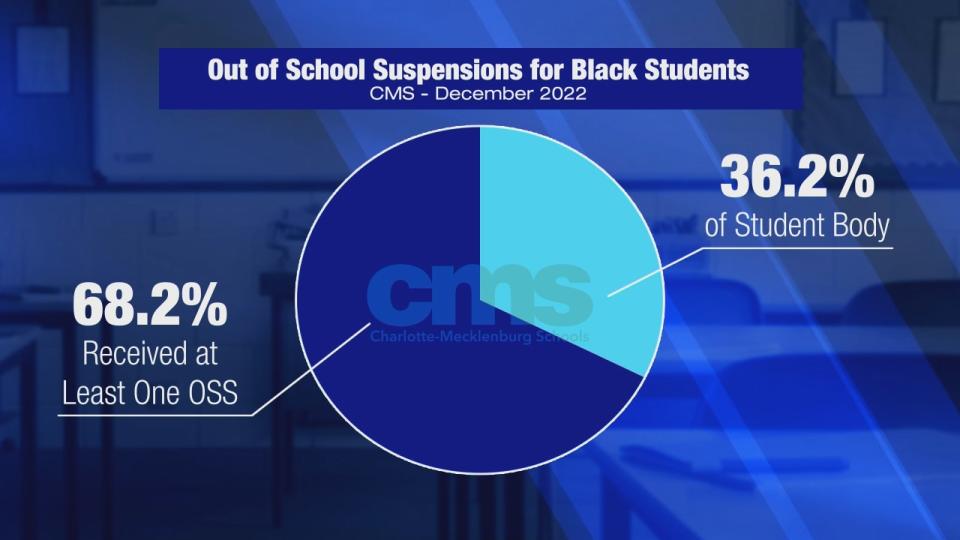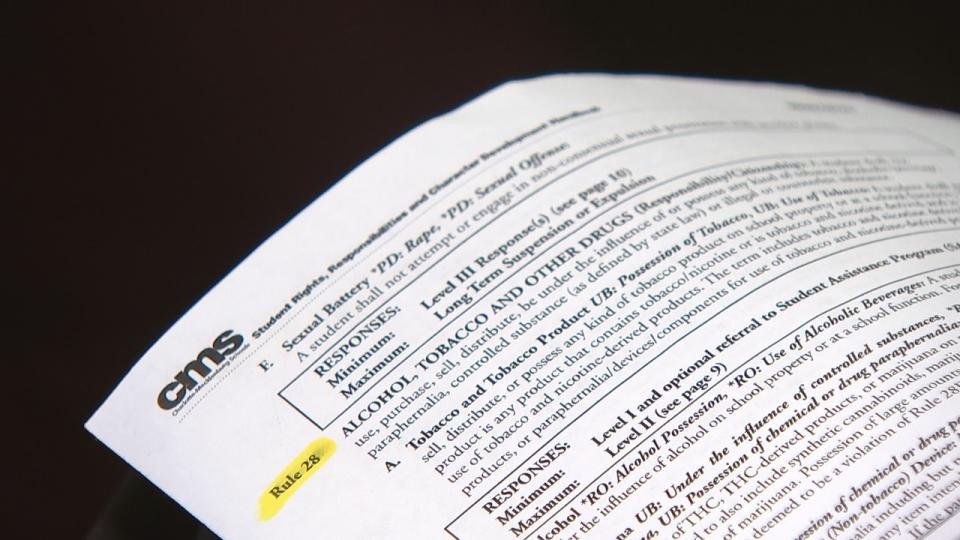9 Investigates disproportionate school suspensions for minority students
More students across North Carolina are being suspended from school. According to the North Carolina Department of Public Instruction, there was a 23% jump in long-term suspensions in the 2021 to 2022 school year compared to the one just before the pandemic, and minority students are being suspended at a higher rate.
Education reporter Jonathan Lowe investigated the disparity in punishments at Charlotte-Mecklenburg Schools.
Angela Diaz’s 12-year-old son was too shy to speak on camera about his recent long-term suspension from Crestdale Middle School, but she was more than willing to talk to Lowe about his punishment she feels far exceeds the crime.
ALSO READ: CMS teacher suspended after grabbing and cursing at student
“He found a vape, he thought it was interesting, he said everybody was vaping in school so why not take it in,” Diaz explained.
When it fell out of his pocket and his teacher found it, she said the principal told her it constituted a “severe violation.”
“The decision was 45 days and probation, which -- 45 days out of his home school -- I think it was unfair for a boy who, this was his first violation,” Diaz said. “This was unfair.”

Diaz made it clear that she was not excusing her son’s actions. She said she leveled her own punishment.
“Of course I did, he got his phone -- he wasn’t allowed to go to his friends,” she said.
She said he was suspended and assigned to alternative school Turning Point Academy because administrators thought marijuana was in the vape pen, which she disputes. On top of that, Diaz said those administrators enhanced the matter, accusing her son of distribution because he shared it with other students.
ALSO READ: CMS substitute teacher says she won’t return to school after being attacked by 2 students
“It was a naïve mistake,” she said. “He did not know what he was sharing -- because I am not going to say distributing.”
Rule 28 of the CMS Student Code of Conduct addresses alcohol, tobacco, and other drugs. Under Section C on marijuana, for a first time offense, administrators have the option of giving a short-term out-of-school suspension of up to 10 days with a referral to a student assistance program.
However, the sale and/or distribution of the drug -- what Diaz says her son is accused of -- can lead to more severe consequences like long-term suspension or expulsion.

Dee Rankin is a CMS school board member. Part of his duties include presiding over disciplinary hearings.
“Right now, some of the suspensions, I think, are disproportionate in Black and brown communities,” he said.
Data CMS released in February shows as of late December 2022, while Black students made up 36.2% of the overall student body, 68.2% percent of Black students received at least one out-of-school suspension.
Rankin said part of the problem appears to be varying interpretations of the infractions detailed in the code of conduct and the consequences connected to them.
ALSO READ: Alternative high school in west Charlotte struggling with safety concerns, teachers say
“Some people are obviously choosing 30 to 45 days, and some are saying ‘let’s try something different’ to really get to the root of what’s going on with that kid,” Rankin said.
He’s concerned about how excessive suspensions can impact a student’s educational growth.
“Even if you give the kid 10 days, that’s two weeks out of school that you’re missing,” Rankin said. “That’s a lot of work, that’s a lot of class time.”
He hopes his fellow board members will work with him to standardize the implementation of the Student Code of Conduct, provide better professional development for staff members, and more resources for students who have behavioral issues.
“I’m passionate about discipline because I think the school to prison pipeline is real, and it’s affecting our Black and brown kids,” Rankin said.
Earlier this year, CMS said the reduction of out-of-school suspensions is a priority for district leadership and that’s been communicated to school staff. Their efforts include increasing school safety and improving school climate while also providing alternatives to those suspensions.
Lowe reached out to CMS multiple times for a comment about Diaz’s son’s case but has not heard back.
(WATCH BELOW: 7 students treated for carbon monoxide exposure after getting sick on school bus)

